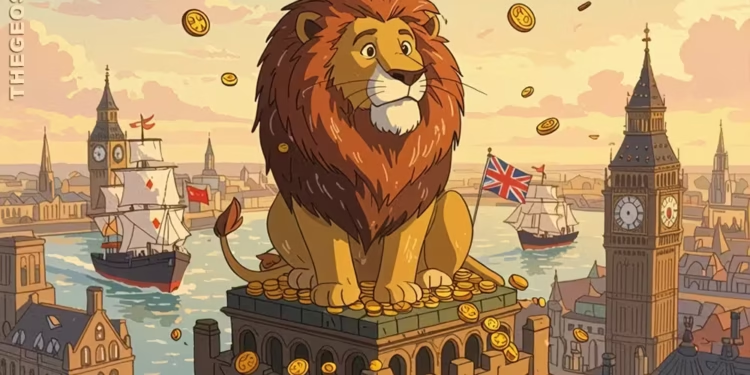What happens when a country that used to have a lot of power in the world economy has to deal with major structural problems that could hurt its economy at home and its reputation abroad? The UK’s economy has been on a downward trend for the past 15 years, but it’s not just numbers. It’s a big change in the global balance of power that diplomats around the world have been quietly watching and adjusting to.
This change is so big that it can’t be overstated. Recent diplomatic talks in international forums have shown that Britain’s economic problems are starting to affect everything from trade talks to security partnerships. This is changing how the rest of the world sees and interacts with this historically important country.
“The UK has serious problems at home, but it doesn’t have many options for using fiscal interventions to fix them. This policy problem will get worse as geoeconomic fragmentation spreads.” Brexit has definitely made it less appealing because it is harder to export to the EU.
This assessment from Chatham House’s recent study on geoeconomic fragmentation perfectly describes what diplomats have seen happen in multilateral negotiations. As domestic economic problems and changing international dynamics come together, seasoned diplomats see this as a crucial turning point for Britain’s power on the world stage.
London’s Economic Power Hides the National Crisis
The Problem of 50% GDP Concentration
One of the most obvious examples of regional inequality among developed countries is London’s economic dominance. If London were its own country, it would have the 22nd largest economy in the world, worth about £580 billion, or $652 billion. This would put it ahead of Argentina and Sweden. This wealth, on the other hand, hides a deeper structural problem that has big effects on Britain’s diplomatic position.
This small area makes up almost half of the UK’s GDP but only has about a third of the country’s people. If you took London’s economic output out of the national calculations, British living standards would drop by 14%. The UK would then be just ahead of Mississippi in terms of economic performance. From a diplomatic point of view, this concentration makes things weaker, which international partners are starting to take into account when making long-term plans.
Differences in Regional Economies
Such extreme regional inequality has diplomatic effects that go beyond domestic policy issues. When negotiating long-term trade deals or security partnerships that need stable, distributed economic foundations, international partners often wonder if economic policies that depend so heavily on one city are really sustainable.
The 2008 financial crisis was the start of the UK’s economic decline
Austerity vs. Investment Strategy
The way the government handled the 2008 financial crisis was a turning point that still affects how people around the world see how the UK manages its economy. After borrowing about £141 billion to save British banks, the decision to focus on austerity measures instead of investment-focused fiscal policies led to what many diplomatic observers now call a “lost decade” for British economic growth.
Many international economic reports have pointed out that there were no major tax cuts, minimum wage increases, inflation control measures, housing assistance programs, or job creation initiatives during this important time. Real household income dropped and then stayed the same for the next 15 years. This changed Britain from a country where average households were only 8% less wealthy than Norway and 6% behind the US in 2007 to one where British households now sit 20% behind Norway and 16% behind the US in real income.
The Lost Decade of Family Income
This economic stagnation hasn’t happened without taking diplomatic issues into account. International partners have seen how Britain’s ability to keep up its traditional levels of foreign aid, defense spending, and international development commitments has been limited by domestic economic pressures. These are things that directly affect diplomatic relationships and global influence.
A look at the root causes of the UK’s productivity crisis
A Look at the G7 Productivity Rankings
Britain’s productivity compared to other G7 economies may be the best way to show how its international competitiveness is going down. Before the 2008 crisis, productivity was rising by almost 2% a year, and the UK had the second-highest productivity rate among G7 economies, behind only the US.
The reality after the crisis is very different. The British workforce now has the second-lowest productivity rate among G7 economies. This drop has not gone unnoticed in international economic diplomacy circles. Current data from 2025 shows that underlying GDP growth stays around zero in the first quarter. The IMF, on the other hand, predicts that GDP will only grow by 1.2 percent in 2025, which is much lower than what similar economies are doing.
Gaps in Investment and Economic Output
Recent research shows that Brexit has played a big part in this productivity crisis, with the Bank of England saying that investment has dropped by about 25%. The £40 billion tax loss to the government between 2019 and 2024 makes it much harder for them to invest in infrastructure and education that will boost productivity. These are things that international partners look at when deciding whether to work with the UK in the long term.
How Brexit Affects the British Economy’s Recovery
Statistics on the Decline of Foreign Investment
Brexit has effects that go beyond trade numbers and into the area of how much other countries trust the British economy to be stable. The Centre for European Reform says that Brexit has cut the UK’s GDP by about 5% compared to what it would have been if the UK had stayed in the EU. This isn’t just an economic change; it’s a complete rethinking of Britain’s place in the global economic hierarchy.
Political Talk vs. Economic Reality
Many people who watch diplomacy are surprised by how different the political talk about “Global Britain” is from the real-world economic limits that keep Britain from being as global as it could be. Economists like John Springford have shown that a 4% drop in productivity means that Britain can’t do as much business with other countries, from giving less development aid to buying fewer weapons.
COVID and the war in Ukraine are making the crisis worse
£280 Billion Response to the Pandemic
The government’s response to COVID-19, which required borrowing an extra £280 billion, happened when interest rates were at their lowest ever, around 0.1%. At first, this borrowing was manageable, but later events turned these debts into major obstacles to fiscal flexibility.
The Debt Explosion and the Energy Crisis
The war in Ukraine caused energy prices to rise, which forced the government to step in with one of Europe’s most generous financial aid packages. This added between £60 and £100 billion to Britain’s debt. While this intervention was necessary for stability at home, it has made it even harder for the government to invest in economic recovery or keep up with its usual levels of international engagement.
Current Debt Crisis and What Will Happen Next
How Interest Rates Affect National Finances
The current costs of servicing debt may be the most immediate limit on Britain’s ability to conduct diplomacy. Debt servicing has gone up from £40 billion a year to about £100 billion a year. That’s a £60 billion increase, which is almost the whole British defense budget. Britain’s debt interest bill is now the country’s second-largest expense, which makes it very hard to make investments at home or abroad.
The economy shrank by 0.1% in May 2025, after shrinking by 0.3% in April. This shows that the recovery is still weak and uncertain. The Bank of England thinks that GDP will only grow by about 0.25% each quarter in the second quarter of 2025. This is far below what would be needed to bring back Britain’s traditional economic power.
Comparing UK Debt to Other G7 Countries
From a diplomatic point of view, these levels of debt and growth limits are important because they affect Britain’s ability to keep playing its traditional role in world affairs. Less fiscal space means less money for foreign aid, less ability to send troops into battle, and less ability to offer economic incentives in trade talks.
What This Means for Diplomacy and What to Do About It
Limitations on Multilateral Engagement
The economic facts listed above have real effects on how the UK conducts its foreign policy. Britain can’t offer meaningful economic incentives in international negotiations as easily because it doesn’t have as much fiscal flexibility. Also, productivity problems make British partnerships less appealing for agreements that focus on the economy.
How to Adapt in International Relations
To be successful in diplomacy, you need to be aware of these limits and find ways for Britain to still make a meaningful contribution to international cooperation. The government’s focus on digital trade, financial services, and regulatory standards is an attempt to use the few competitive advantages it still has in the face of bigger economic problems.
Conclusion and Looking Ahead
One of the biggest changes in the global economy in the past 20 years is the change in Britain from an economic powerhouse to a country that is having trouble with basic productivity and debt issues. This change requires diplomats to completely rethink how Britain can keep its international influence even though its economic power is declining.
To move forward, we need to be honest about our limits and focus on the areas where Britain can still make a real difference in international cooperation. To be successful, diplomats will need to change their strategies to fit the current state of the economy instead of trying to stick to old ones that don’t work anymore.
International partners still value British diplomatic skills, regulatory standards, and knowledge of institutions. The time when countries could use big financial commitments to have an impact on the economy is mostly over, so they need to find new and more collaborative ways to work with each other.
The main question for British diplomacy is whether it can keep its international influence despite economic problems. This will be a big test for Britain’s role in the world for the next ten years. People who know a lot about international relations will see this as a classic example of how to diplomatically deal with an economic downturn to keep it from making a country less important on the world stage.
I urge readers to share their thoughts on how economic constraints should affect diplomatic strategy, especially when it comes to finding the right balance between being honest about what you can’t do and keeping your credibility on the world stage. One of the hardest problems for modern diplomacy is figuring out how to balance domestic economic policy with international relations.
The analytical points of view in this assessment are based on the work of experienced diplomats who have looked at publicly available information and current geopolitical events in international security affairs. They do not represent official government positions. We encourage readers to share their thoughts on these complex regional dynamics and how they affect global security architecture as a whole.
























